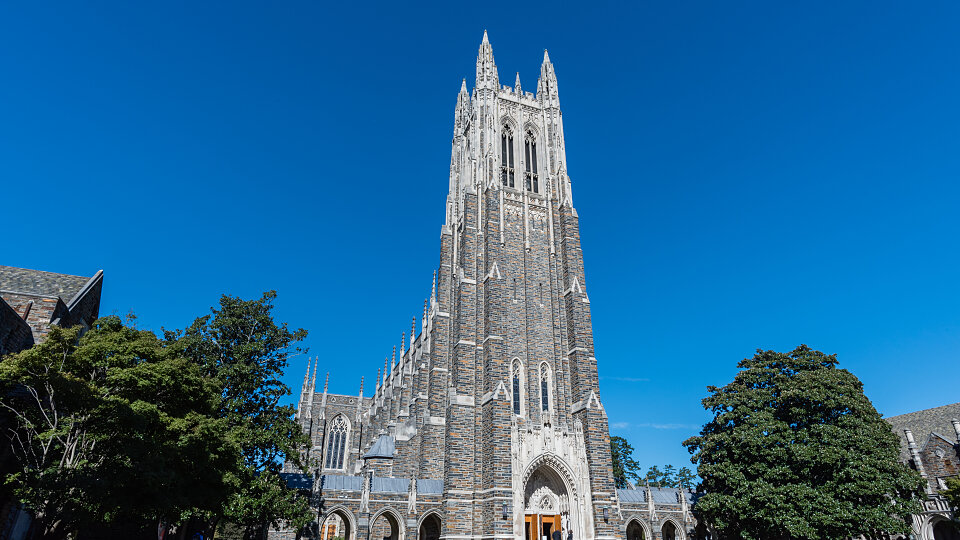What I Value about United Methodism: Intellectual Evangelicalism

Photo: Duke University Chapel Tower
With the recent announcement of the official launch of the Global Methodist Church (GMC), a new Methodist denomination, United Methodist Churches and annual conferences will, in the months ahead, discuss what this means for them. Some churches will choose to leave the UMC. The vast majority, I believe, will choose to stay United Methodist. Over the next couple of months I’ll be posting a series of blogs about what I value in the UMC, opportunities and challenges I see ahead for the church, why I believe the UMC has an approach to the gospel that will connect with 21stcentury people, and why I am and will continue to be a United Methodist. Below is the first of these articles.
What I Value about United Methodism: Intellectual Evangelicalism
I became a follower of Christ in a small and loving Pentecostal congregation at the age of 14. Two years later I heard a call to vocational ministry in that same community. I loved the passionate personal faith of the pastor and church members, and the emphasis on Bible reading and memorization, the work of the Holy Spirit and joy.
As a new Christian and a young adult, I was intellectually curious, academically serious, and passionate about following Christ. This led to questions of my newfound faith. Some of my questions were related to science and the Bible, some to biblical interpretation (particularly related to my Pentecostal church’s teaching on the end times and whether speaking in tongues was the evidence of the infilling of the Spirit). Some of my questions were about theology (particularly related to making sense of suffering as I often heard friends describing suffering as the will of God). I had a passionate faith in Christ, but, in Anselm’s terms, my faith was “seeking understanding.”
What drew me to the United Methodist Church was its intellectual evangelicalism, or what Charles Wesley once described as the union of “knowledge and vital piety.” The 18th century Methodist revival started on the campus of Oxford University among college students and was led by an Oxford professor”[1] Those early Methodists valued the intellect and spiritual passion and the Methodist movement included reading, studying, and critical thinking as well as prayer, scripture study, and other spiritual disciplines. Methodists were not required to check their brains at the door of the church but encouraged to engage the intellect and the heart in pursuit of Christ. I loved this!
When Methodists came to America, they were so committed to a faith that encompassed both the head and the heart that they not only started churches, but also public schools, colleges, universities, and graduate schools further fostering their intellectual evangelicalism and equipping students to “serve the present age.” Today there are 117 United Methodist related colleges, universities, seminaries and other graduate schools, among which are some of the finest universities in America. This intellectual evangelicalism is also seen in the requirements for ordination or licensing for pastoral ministry in the church. Ordained clergy and licensed local pastors are required to pursue a rigorous education as part of their preparation – for ordained pastors this is typically eight years of college and seminary, for licensed local pastors the path includes years of serious training and coursework through the Course of Study.
I’m reminded of Norman Maclean’s novella, A River Runs Through It, set in America in the early 1900’s. Maclean described Methodists as “Baptists who could read.” He meant it as an insult to both Baptists and Methodists (!) but it captured something important. Methodists had a personal, passionate evangelical faith not unlike the Baptists, but added to that an emphasis on learning and the intellect.
The dual emphasis on the intellect and the heart, on knowledge, and vital piety, is part of what I found, and continue to find, compelling about United Methodism. This faith doesn’t allow for the kind of anti-intellectualism sometimes seen among Christians. It values scientific inquiry and isn’t threatened by the latest discoveries of modern science. It reads the Bible in the light of the historical and cultural context in which scripture was written and values the role tradition, experience, and reason play, with the Holy Spirit, in illuminating and interpreting scripture. It embraces the intellect, while not neglecting the importance of a “strangely warmed heart.”
United Methodism is not the only church that embraces the intellect – other Christian denominations have formed colleges and universities and emphasize the intellect. Two colleagues, one an Episcopal priest, the other a Presbyterian pastor, both tell me their churches place a heavy emphasis on the intellect as well. But they note that what their traditions sometimes miss is the personal, evangelical faith that is an essential part of United Methodist history and DNA.
As a young adult I heard someone once describe United Methodism as “a church for thinking people.” That was exactly the kind of church I was longing for when I joined the United Methodist Church in 1983. And it is the kind of church, coupling the intellect with the evangelical longing to draw people to Christ, that I still love today.
Adam Hamilton is the senior pastor of The United Methodist Church of the Resurrection in the Kansas City area. He has written 35 books and his sermons are heard by 34,000 people weekly.
[1] John Wesley was a “fellow” of Oxford which meant that he both instructed and mentored students and had certain recognition and privileges as part of the faculty at Oxford. Technically fellow is not necessarily equivalent of professor, in practice these were at times used interchangeably.